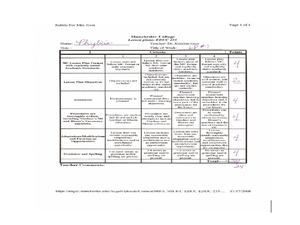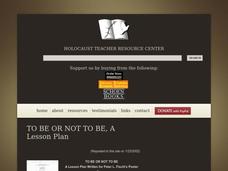Curated OER
At the Park
Students in ESL classes read and interpret sentences about the park. They change the verb tense of the sentences and practice writing their own sentences. Student pairs read/perform dialogues in front of the class.
Curated OER
The Little Engine That Could
Students read the story The Little Engine That Could and read companion stories, predict in a chart, work with rhyming and word families, and more. For this reading lesson plan, students take 5 days to read the book.
Curated OER
Probably Passage (Predicting)
Third graders practice predicting. In this prediction lesson, 3rd graders read a worksheet and they predict where 15 words will fit into the story. After they read the story, they discuss the similarities and differences between their...
Curated OER
Introduction of the Human Heart
Fifth graders make their observations about the structure of the human heart. Students trace the flow of blood through the human heart. They touch a model of the human heart, 5th graders read aloud a handout that is found in their...
Curated OER
Rural Homelessness
Students read about rural homelessness. For this homelessness lesson, students read about rural homelessness and practice their note taking skills. Students discuss rural homelessness as a group and answer the provided questions.
Curated OER
The Witch of Goingsnake
Students identify figurative language in a proverb and write an interpretation of the proverb prior to reading The Witch of Goingsnake. In this The Witch of Goingsnake lesson, students read a native American proverb and determine whether...
Curated OER
Harry the Dirty Dog
Pupils investigate the parts of a book by reading a story about a dog. In this reading comprehension lesson, students utilize their memory to place pictures from the book Harry the Dirty Dog in order from start to finish....
Curated OER
What about Babuie's Behavior?
Learners read the story about Babuie's behavior and relate it to a finite state machine. In this language arts lesson, students discuss and analyze their reading assignments. They develop a method to help them understand the finite state...
Curated OER
The Pledge of Allegiance
Young scholars explore U.S. history by identifying American symbolism. In this American Flag instructional activity, young scholars read the poem "The Flag" by M. Hubbard and define the symbolism of the colors and stripes within the U.S....
Curated OER
Author's Corner
Second graders read a picture book at a Web site about a bunny who solves a problem and becomes friends with a squirrel. Students then discuss story with classmates, brainstorm ideas for their own stories about friendship, and read the...
Curated OER
The Day is Done Questions
In this reading comprehension worksheet, students respond to 5 short answer and essay questions based on the poem "The Day is Done," by Longfellow.
Curated OER
Who Serves Time? Breaking Down Stereotypes About Juvenile Offenders
Learners read and discuss article "Doing Time," explore juvenile justice system and juvenile hall, and discuss stereotypes of young offenders.
Curated OER
Exploring the Universal Declaration of Human Rights, Part 2
Students are given a copy of the "The Universal Declaration of Human Rights" and read them together. In groups, they match the rights listed on a master list with the articles in the Declaration and research specific rights using the...
Curated OER
A-Scripting We Will Go
Students write script for a puppet show. In this writing lesson plan, students write a puppet show script using facts from a previous lesson plan. They listen to DyAnne DiSalvo Ryan's, City Green before discussing the characters and...
Curated OER
Fiction Elements in Hatchet
Students read or listen to Hatchet by Gary Paulsen, identify elements of fiction, develop writing, thinking, and organizing skills, and create PowerPoint slides based on the story.
Curated OER
Acting with Integrity
Learners discuss the meaning of integrity. In this language arts lesson, students work in small groups to read scenarios and discuss how integrity applies to all scenarios. Learners discuss what the benefits of having integrity are.
Curated OER
Dramatizing Folktales, Legends and Myths
Learners read different folktales from Native American cultures. They work together to act out different scenes. They discover the difference between folktales, legends and myths.
Curated OER
To Be Or Not To Be
Students read the poem "To the Little Polish Boy Standing With His Arms Up." They discuss the poem. Students define the term "prejudice." They comapre and contrast the boy in the poster with the author of the poem, Peter Fischl. ...
Curated OER
The Poet's Message-"The Colored Soldier" by Langston Hughes
Young scholars analyze the poem, "The Colored Soldier" by Langston Hughes to gain a greater experience of how poets use language to create meaning, influence thinking and thus become pioneers of change in American society. They work on...
Curated OER
What Do Seals Eat?
Students recognize the ea=/E/ correspondence in spoken and written words. They participate in a group letterbox lesson. In groups of two, they practice reading with each other, taking turns reading one page at a time, identifying the...
Curated OER
Figurative Language and Symbolism
Young scholars identify figurative language and symbolism in poetry as well as prose. In this literary elements lesson, students read and discuss the role of symbolism in Yellow Man by Moonlight, A Christmas Carl, The House of Wings, and...
Curated OER
Incident
Learners gain insight into human behavior from the study of literature. They read a poem and respond by creating a poem of their own. After a lecture/demo, students utilize a worksheet imbedded in this plan to help them compose an...
Curated OER
The Lott House - a History Mystery
Students read a newspaper article about the historic Lott House in Marine
Park, Brooklyn. They study the history of slavery in New York and uncover the secrets of a historic Brooklyn farmhouse that kept slaves and later protected them...
Curated OER
Story Parts
Third graders identify the three major parts of a story. After reading the book "Stellaluna," students discuss the beginning, middle and end of the story. They write a short story depicting the events that would happen if the story...

























